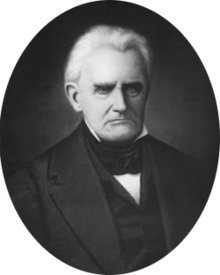Montgomery Bell
| Montgomery Bell | |
|---|---|

Bell circa 1840-1850
|
|
| Born | January 3, 1769 Chester County, Pennsylvania |
| Died | April 1, 1855 Dickson County, Tennessee |
| Occupation | Businessman |
| Parent(s) | John Bell Mary Patterson |
Montgomery Bell (January 3, 1769, Chester County, Pennsylvania – April 1, 1855, Dickson County, Tennessee) was a manufacturing entrepreneur who was crucial to the economic development of early Middle Tennessee. He was known as the "Iron Master of the Harpeth" and the "Iron Master of Middle Tennessee". Today he is remembered mostly for founding one of the largest non-sectarian all-boys private secondary schools in the United States, which bears his name.
Montgomery Bell was born on January 3, 1769 in Chester County, Pennsylvania. His father, John Bell, was an Irish emigrant to the United States. His mother was Mary Patterson. He was of Scotch-Irish descent on both sides.
Bell served a three-year apprenticeship to a tanner and later became a hatmaker with an older brother. At age 20, he left Pennsylvania for Lexington, Kentucky where a widowed older sister lived and opened a hat-making business paying for the education of his sister's children.
Bell moved to Middle Tennessee and became involved in the iron business purchasing James Robertson's iron works at Cumberland Furnace, Tennessee in 1804 for $16,000. Bell expanded his operations and built other furnaces and mills including a hammer mill south of Charlotte, Tennessee on Jones Creek using water power.
By 1808, Bell was buying wood at 50 cents per cord for charcoal to fuel his Cumberland Furnaces which cast cannonballs used in the War of 1812 by General Andrew Jackson's troops at the Battle of New Orleans. Bell built another forge and hammer mill called "Pattison Forge" after his mother's maiden name. Bell finished a tunnel approximately 100 yards (91 m) long through a narrow limestone and sandstone ridge from a point seven-miles upstream creating a 4-foot fall to operate his hammers and forge. There had been an earlier plan to shorten the river path for flatboats to ship goods. Bell named another of his iron works "Worley Furnace" after James Worley, a slave.
Bell made the Narrows his operational headquarters and built a home there which he called Bell View. A nearby unincorporated community where many of his workers lived is called Bell Town. Bell suffered losses in the Panic of 1819 and in 1824 he advertised the Narrows and other properties for sale in the Nashville Whig. Bell offered to sell his ironworks to the U.S. Army for an Armory but floods on the Harpeth were well known and that idea failed. The Narrows property was not sold during Bell's life but much was lost through looting, flooding, and the effects of time. The tunnel remains and part of the Tennessee State Park system.
...
Wikipedia
